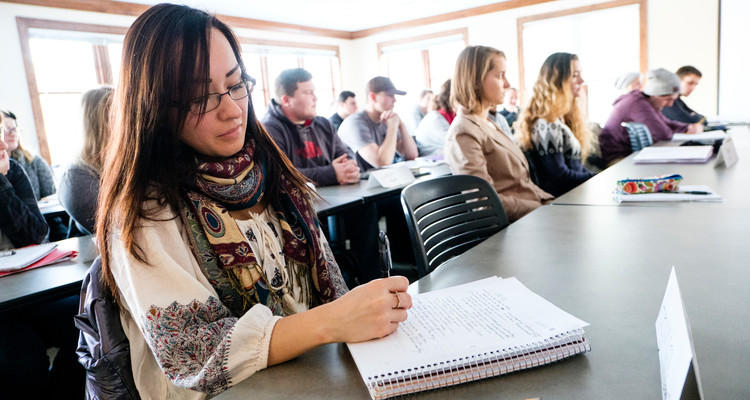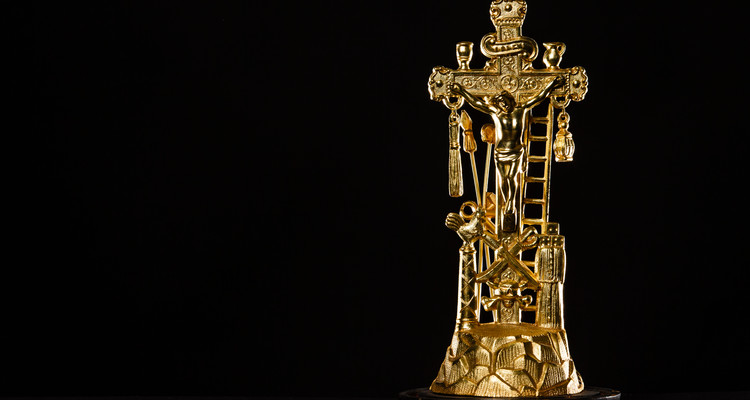Maddie Shogren ’17, a secondary math education major, registered for Christian Faith and Entrepreneurship (CathStudies 306) because a friend told her she could apply what she learned in the course to “everything.” Little did she know “everything” would begin in total silence.
Co-taught by Drs. Michael Naughton and John McVea (Entrepreneurship Department, Opus College of Business), the course asks who is a good entrepreneur and how does he or she contribute to the common good? It then pursues these questions within the Catholic social tradition, exploring the theological relationship between work as a vocation and leisure as contemplation. Naughton and McVea begin each class by inviting students to sit in silence for about five minutes. Over the semester, students are introduced to techniques for contemplation as a regular life practice.
“It’s the first thing I think of when I think of this class,” Shogren said, who will be entering the Pro Ecclesia Sancta order for women this summer. “I have integrated silence into my daily schedule thanks to this class. ... I find it very prayerful. When I am taking a few minutes to quiet my mind and not think, I am really focusing 100 percent of my energy on being the person God has made me to be in that moment. Now, I crave daily silence.”
The course is designed, in part, to combat a wildly un-recollected world. Knowing and operating from one’s center is essential for creative, ethical business solutions and often difficult to establish in a culture ill-formed in recollection.
Researcher Sherry Turkle describes it aptly when she writes: “The self shaped in a world of rapid response measures success by calls made, emails answered, texts replied to, contacts reached. ... We insist that our world is increasingly complex, yet we have created a communications culture that has decreased the time available for us to sit and think un-interrupted. As we communicate in ways that ask for almost instantaneous responses, we don’t allow sufficient space to consider complicated problems.” Naughton reminds his students, as Josef Pieper has expressed, “Only the silent hear.”
In an attempt to combat some obstacles to becoming centered, Naughton and McVea challenge their students to write an essay, the title of which is taken from the popular NPR series: “This I Believe.”
“We ask our students to articulate a belief of theirs,” Naughton said. “It is a powerful moment in the class since we begin to see the stories that lie behind the person. They find as they begin to work on the assignment that the real questions spring from something deeper, which is ‘What is my center?’”
Naughton and McVea pepper the course with readings that emphasize the importance of developing a strong theological foundation.
St. Augustine’s story is a favorite.
“It reveals a startling claim,” Naughton said. “We are not a good center for our lives. We, by defining our center and becoming the center, mess things up. If we are the center, we end up worshipping ourselves.”
The assignment presses students to reach into their core principles – and touch the center of all they believe. Following are two student responses.
That Two Become One by Maddie Shogren '17
 Growing up, Dad would always tell Mom that she’s beautiful. She didn’t always believe it, but he said it anyway. I can remember him spelling out “Happy Birthday” in sandbur killer in our backyard one year, and I can remember her spontaneously making his favorite dessert, lemon poppy seed cake. He loved that. Mom and Dad were simple. They enjoyed dates where they went on bike rides or ate free samples at Costco. They were goofy and in love. I knew they weren’t perfect because I would see them argue about ... how to handle something, but I did know that they didn’t hold grudges. This is what I thought I believed marriage to be – fun, simple misunderstandings, happiness and joy.
Growing up, Dad would always tell Mom that she’s beautiful. She didn’t always believe it, but he said it anyway. I can remember him spelling out “Happy Birthday” in sandbur killer in our backyard one year, and I can remember her spontaneously making his favorite dessert, lemon poppy seed cake. He loved that. Mom and Dad were simple. They enjoyed dates where they went on bike rides or ate free samples at Costco. They were goofy and in love. I knew they weren’t perfect because I would see them argue about ... how to handle something, but I did know that they didn’t hold grudges. This is what I thought I believed marriage to be – fun, simple misunderstandings, happiness and joy.
On the first day of Thanksgiving break my sophomore year of college, I walked through the doors of Mercy Hospital in Coon Rapids, Minnesota. It was a bone-chilling Wednesday in November. As I walked through the doors, I could smell hospital – sterile, strange, unwanted
hospital. With Mom in front of me, and my four siblings behind me, I walked to the ICU where Dad had been for the past three days. The Sunday before, he had fallen off our roof back home and hit his head on the sidewalk. Dad was suffering from a traumatic brain injury.
As I turned the corner, I saw Dad sitting up in his hospital bed trying to read the hospital menu. Mom announced, “Jon, Maddie came today.” Dad looked at me like I was someone he had just met. He didn’t realize he was in the hospital. Mom went to the end of his bed and began
rubbing his feet. “Jon, do you remember where you are? Honey, you’re in the hospital ’cause you hit your head.” Dad looked at her like he was a child.
Tears began to roll down my cold cheeks as the severity of his injury sunk in. I watched him struggle to comprehend what Mom was telling him. “Yikes,” he replied. I listened as Mom began re-explaining what had happened, which she had been doing multiple times a day for the past three days.
As worry and fear began to creep up inside me, I noticed my parents’ connected eyes. In that moment, I could have been overcome with thousands of worries. But instead, I was overcome with something else.
As Mom rubbed Dad’s feet, I watched her gaze at him with an immeasurable amount of love and care. Her bravery inspired me as she let go of control and fear and instead just loved and trusted. But it was the love in Dad’s eyes that left me speechless. He literally wasn’t “fully” there, but somehow his heart knew Mom, and he stared at her with a love that is so deep that I’ll never be able to explain it. I’ve never seen such beauty! I was seeing “the two as one.”
Marriage is more than fun and games. It is also about hardship, pain, the simple communications and living the mundane together. Marriage is self-sacrifice. Twenty-three years, five children, four miscarriages, thousands of laughs, hundreds of struggles. This is my parents and this is why I believe that the two become one.
That Suffering Brings Wisdom and a Deeper Capacity to Love by Alejandra Chavez Rivas '18
In my teenage years, I endured a lot of tribulations but I truly thought my sufferings were over when I was accepted as an undergraduate at the University of Minnesota. But about one week before classes would start, I found out I was pregnant and would have to drop out. I was 18.
I went to my boyfriend’s house to tell him the news. He told me I was lying, that the child wasn’t his and that he wanted nothing to do with me, and slammed the door in my face.
Then, late one night, I heard the doorbell ring. It was my friend’s mother. As we sat in my basement, she asked me, “Why are you bringing a child into the world to suffer? No baby should be born without its father.” She informed me that there was an abortion clinic in Minneapolis
that could “get rid of the fetus.” As she got up to leave she said, “If you keep this baby you will lose your dignity of being a worthy woman.”
This was some of the worst sufferings I have gone through in my life. I was flooded with memories of the past. At the age of 3 my father had left my mom for another woman. She had to raise three kids on her own. For four years, I listened and watched my uncle beat his wife. I still have images of the bruises on my aunt’s face and of the blood that would flow out of her nose. I watched as my cousin would scream and yell at her dad to stop. My mom was too busy working and when she was at home she took her stress out on us. I did not get tucked in at night or have bedtime stories read to me. I remember one night, when I hid under the bed trying to read my mother’s mood and decide if today was going to be a day she would spank me with a cable, a broom, a pan or a belt.
The thought of being a mother frightened me. I felt that part of my sufferings from my childhood did not equip me to be a good mother or even have a solid foundation on how to raise a child. I was an emotional wreck but from the depth of my heart I knew I was not in control again. Amidst all of my confusion and distress I allowed things to be. I made the decision to have my child, even if that meant doing it alone.
On April 28, my daughter was born. I remember holding her in my arms for the first time as I touched her soft cheek and with one hand she grabbed hold of my other thumb and held tightly. She laid there on my chest and snuffled out a tiny snore. Somehow I felt as if my heart
was outside of my body. It was the greatest feeling and nobody could take that away from me.
The sufferings of my past tried shaping my truth and my life. It’s true I am imperfect, but to my daughter, I am irreplaceable. When my little girl cries, she calls for “Mama.” When she reaches out, it’s for me, and me alone. Love doesn’t consider past transgressions; nor wait to make sure it will be returned; nor wait for something better to come along. Even though I have been stretched beyond my limits, suffering has enabled me to pick up the pieces of my broken life and go on, renewed with a stronger capacity to love intensely, inexplicably and unconditionally.





